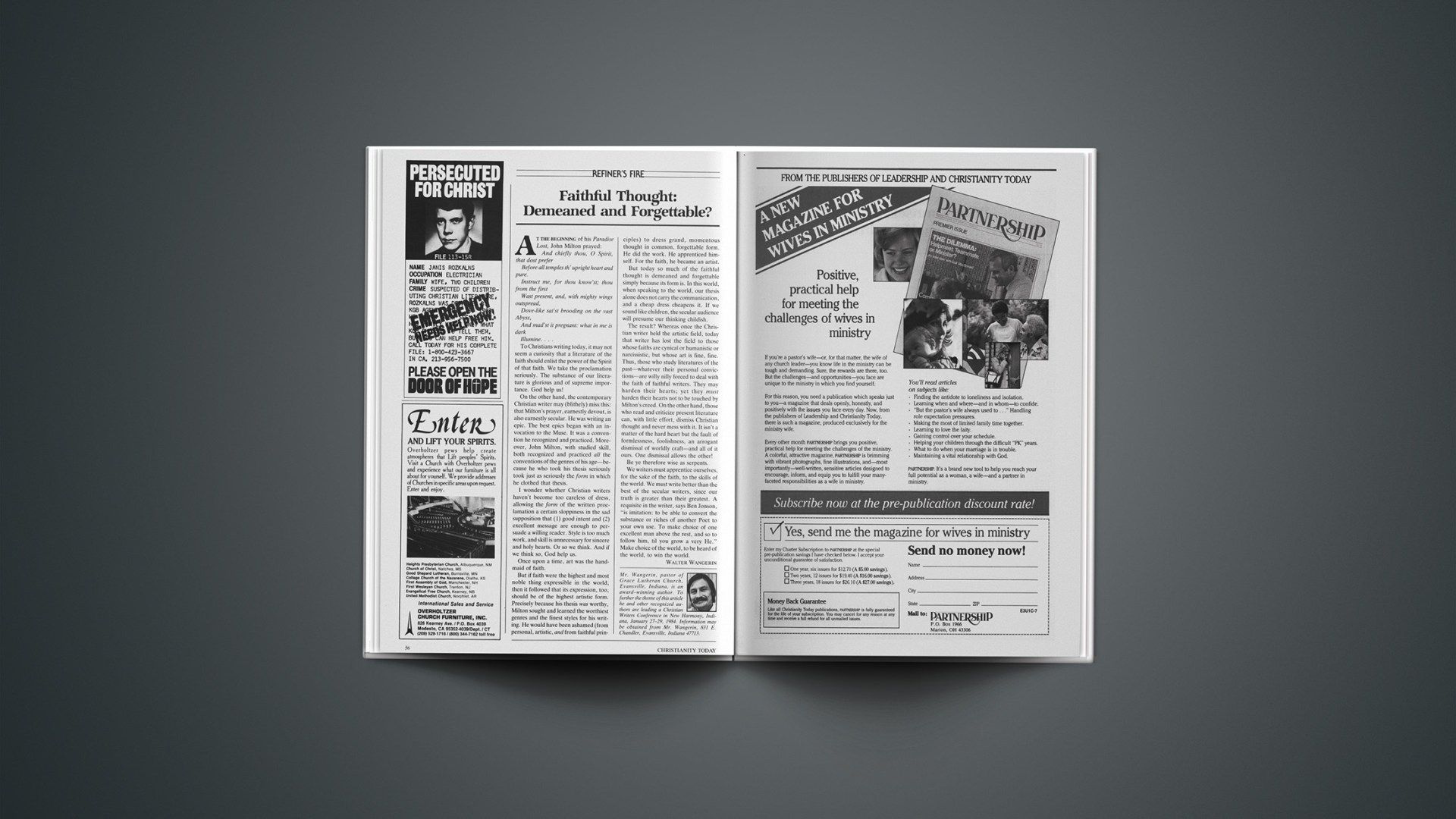At the beginning of his Paradise Lost, John Milton prayed:
And chiefly thou, O Spirit, that dost prefer
Before all temples th’ upright heart and pure.
Instruct me, for thou know’st; thou from the first
Wast present, and, with mighty wings outspread,
Dove-like sat’st brooding on the vast Abyss,
And mad’st it pregnant: what in me is dark
Illumine.…
To Christians writing today, it may not seem a curiosity that a literature of the faith should enlist the power of the Spirit of that faith. We take the proclamation seriously. The substance of our literature is glorious and of supreme importance. God help us!
On the other hand, the contemporary Christian writer may (blithely) miss this: that Milton’s prayer, earnestly devout, is also earnestly secular. He was writing an epic. The best epics began with an invocation to the Muse. It was a convention he recognized and practiced. Moreover, John Milton, with studied skill, both recognized and practiced all the conventions of the genres of his age—because he who took his thesis seriously took just as seriously the form in which he clothed that thesis.
I wonder whether Christian writers haven’t become too careless of dress, allowing the form of the written proclamation a certain sloppiness in the sad supposition that (1) good intent and (2) excellent message are enough to persuade a willing reader. Style is too much work, and skill is unnecessary for sincere and holy hearts. Or so we think. And if we think so, God help us.
Once upon a time, art was the handmaid of faith.
But if faith were the highest and most noble thing expressible in the world, then it followed that its expression, too, should be of the highest artistic form. Precisely because his thesis was worthy, Milton sought and learned the worthiest genres and the finest styles for his writing. He would have been ashamed (from personal, artistic, and from faithful principles) to dress grand, momentous thought in common, forgettable form. He did the work. He apprenticed himself. For the faith, he became an artist.
But today so much of the faithful thought is demeaned and forgettable simply because its form is. In this world, when speaking to the world, our thesis alone does not carry the communication, and a cheap dress cheapens it. If we sound like children, the secular audience will presume our thinking childish.
The result? Whereas once the Christian writer held the artistic field, today that writer has lost the field to those whose faiths are cynical or humanistic or narcissistic, but whose art is fine, fine. Thus, those who study literatures of the past—whatever their personal convictions—are willy nilly forced to deal with the faith of faithful writers. They may harden their hearts; yet they must harden their hearts not to be touched by Milton’s creed. On the other hand, those who read and criticize present literature can, with little effort, dismiss Christian thought and never mess with it. It isn’t a matter of the hard heart but the fault of formlessness, foolishness, an arrogant dismissal of worldly craft—and all of it ours. One dismissal allows the other!
Be ye therefore wise as serpents.
We writers must apprentice ourselves, for the sake of the faith, to the skills of the world. We must write better than the best of the secular writers, since our truth is greater than their greatest. A requisite in the writer, says Ben Jonson, “is imitation: to be able to convert the substance or riches of another Poet to your own use. To make choice of one excellent man above the rest, and so to follow him, til you grow a very He.” Make choice of the world, to be heard of the world, to win the world.
WALTER WANGERIN1Mr. Wangerin, pastor of Grace Lutheran Church, Evansville, Indiana, is an award—winning author. To further the theme of this article he and other recognized authors are leading a Christian Writers Conference in New Harmony, Indiana, January 27–29, 1984. Information may be obtained from Mr. Wangerin, 831 E. Chandler, Evansville, Indiana 47713.










